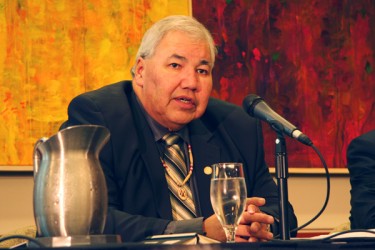Article Origin
Volume
Issue
Year
The Truth and Reconciliation Commission is promising a scathing – and sweeping - report on the federal government and Canadian society.
“Our work of truth telling and truth collecting was not easy. We had challenges throughout,” said TRC Chair Justice Murray Sinclair, at the Special Chiefs Assembly in December in Winnipeg. He said he expected this to be the last time he addressed the Assembly of First Nations since the TRC’s mandate ends July 1, 2015.
Sinclair singled out the federal government’s reticence in handing over documents that dealt with Indian residential schools as one of the TRC’s “significant challenges.” The result was three separate occasions in court, all of which ended with the TRC winning. Sinclair said four million documents, from a variety of sources, have been collected to date, and he expected that number to double.
Sinclair also said that the narrow scope of the Indian Residential School Settlement Agreement, which names only 140 Indian residential schools, has “saddled and hampered” the commission’s work. Excluded from compensation are students who attended any of the non-prescribed schools; day scholars; attendees of residential schools in Newfoundland and Labrador; attendees of Metis residential schools; and those who resided in foster homes and group homes.
“There’s a significant group of students still waiting for justice for their situation,” said Sinclair. “This is a matter we will be addressing in our final report.”
The first two volumes of the report will deal with the history of the residential schools and expand on the TRC’s 2012 interim report. Children taken away to residential school but who never came home, whether they died at school, died running away, or are simply missing, will also be examined.
But the report will not focus solely on residential schools. It will also look at what Sinclair referred to as “legacy issues,” the ongoing impacts on residential school survivors, their descendants and their communities.
“The intention behind the schools was to eliminate Aboriginal culture and Aboriginal languages as very expressly stated in the set-up of the schools, in the way they were established, but it was also stated as an ongoing purpose of the schools existence,” said Sinclair.
The results have been the loss of culture, language, ceremony and spirituality, which has all led to health issues for Aboriginal people; high rates of incarceration and victimization; thousands of murdered and missing Aboriginal men and women; and the loss of economy and education directly related to living in poverty.
“Residential schools were about taking children away from their families in order to acculturate them into a different way of thinking. So residential schools really were just a huge child welfare system and you see the ongoing impact of that role in child welfare system today,” said Sinclair. “We intend to talk about the fact that the child welfare system is continuing, is perpetuating the work of residential schools in many ways, continuing to take children away from parents but also placing them into environments in which they cannot receive their culture, cannot receive their language and do not know who their families and communities are.”
The report on reconciliation may number three volumes, said Sinclair.
“We know there is a lot to be said about reconciliation. (The TRC is) calling for a new attitude and new vision in terms of the relationship in Canada towards Aboriginal people. We are going to talk about the dangers of doing nothing. We know if this country continues on the course that it has … that there are going to be issues that are going to be brought to the public fore that are not going to be pleasant for everybody,” said Sinclair.
He stressed that reconciliation was not an Aboriginal issue but a Canadian issue.
“Everybody who is in position of leadership in this country needs to take action, needs to support action, because we’re of the view that if we wait for the groundswell of movement among the Canadian public, it’s not going to appear soon enough….We know that leaders need to step up, leaders need to show the way of reconciliation. Leaders on both sides need to question the way that they are doing their work, that they are talking to and about each other to ensure that those conversations are being held in a positive way,” said Sinclair.
Perhaps an indication of successful listening can be seen in the recent ruling by the BC Supreme Court to extend the deadline for the $3,000 personal education credits. The request was filed in court by Justice Canada at the urging of AFN, said AFN Communications Officer Jenna Young. All signatories to the IRSSA agreed to the extension. With personal education credits finalized only as of October 2013, less than one-third of the approximately 79,000 eligible Common Experience Payment recipients had submitted applications by December 2014.
The closing ceremony for the TRC will be held May 31 to June 2 in Ottawa. It will begin with a reconciliation march, which Sinclair said is important.
“We know without that public display, without that public showing, (people) will be able to say this is all irrelevant, no longer of any importance,” he said.
- 1931 views

